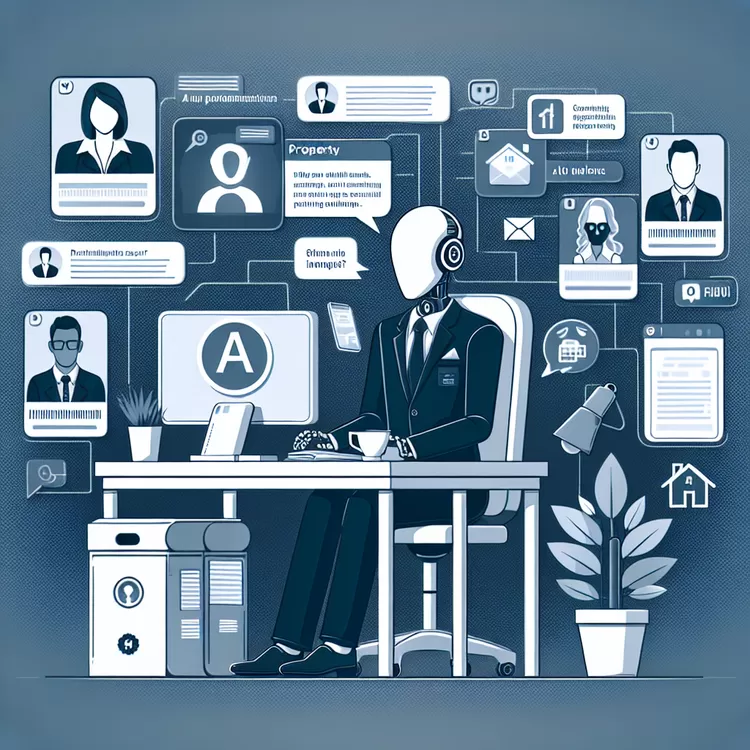A property expert named Rob Dix has created a digital clone of himself using artificial intelligence (AI) software. This clone takes the form of a chatbot on his website and can answer questions as if it were him. Mr. Dix fed the clone content such as his books, columns, and podcasts to train it to respond in his tone of voice. He created the clone to help answer the many questions he receives from his followers. Mr. Dix is one of around 150 people who have created AI clones of themselves through a UK company called Coachvox AI.
The use of AI clones is a growing trend, with other companies like Synthesia and Delphi offering similar services. Users can upload their previous written or spoken material, such as videos, podcasts, and articles, to train their clones. The clones can then take on some of their workload, such as talking to employees or offering advice to clients. Coachvox AI claims that their clones can reason on new situations instead of just regurgitating old information. Synthesia goes a step further by creating a talking avatar that appears on screen and can communicate in over 120 languages.
The creation of AI clones has its benefits, such as freeing up time for users and providing instant answers to clients. However, there are also downsides to consider. Some experts caution that AI clones may not always provide the appropriate quality of information, especially in complex business situations. Others worry about the limited awareness of machines and the potential dangers of relying on them for decision-making. Mr. Dix is aware of these concerns and emphasizes to users that they are interacting with technology, not a real person.
Overall, the use of AI clones offers a way for individuals to leverage technology to enhance their productivity and provide valuable information to their audience. However, it is important to approach this technology with caution and recognize its limitations.
Original news source: The people creating digital clones of themselves (BBC)
Listen:
Slow
Normal
Fast
Vocabulary:
| 1 | clone | A digital replica or copy of a person or thing |
| 2 | artificial intelligence | The simulation of human intelligence in machines that are programmed to think and learn like humans |
| 3 | chatbot | A computer program designed to simulate conversation with human users, especially over the internet |
| 4 | content | The information and material that is created and shared online |
| 5 | tone of voice | The particular quality, pitch, and modulation of a person’s voice |
| 6 | followers | People who support and follow someone’s work or ideas |
| 7 | trend | A general direction in which something is developing or changing |
| 8 | workload | The amount of work that a person or machine is expected to do |
| 9 | reason | To think logically and draw conclusions based on evidence and information |
| 10 | avatar | A graphical representation of a person or character that can be used to interact with others in a virtual environment |
| 11 | benefits | Advantages or positive outcomes that result from something |
| 12 | downsides | Disadvantages or negative aspects that result from something |
| 13 | awareness | Knowledge or understanding of a particular situation or fact |
| 14 | technology | The application of scientific knowledge for practical purposes, especially in industry |
| 15 | limitations | The restrictions or limitations that exist in the use or application of something |
Group or Classroom Activities
Warm-up Activities:
– News Summary
Instructions: Divide the class into small groups. Assign each group a different aspect of the article (e.g. the creation of AI clones, the benefits of AI clones, the downsides of AI clones). In their groups, students should discuss the assigned aspect and create a concise news summary of that particular point. Each group will then present their summary to the class, providing a brief overview of their assigned topic.
– Opinion Poll
Instructions: Have the class form pairs or small groups. As a class, brainstorm a list of questions related to the article (e.g. “Do you think AI clones will become more common in the future?”). Each pair or group will then choose one question and conduct an opinion poll among the other students. They should record the responses and then present their findings to the class, including any interesting or surprising results.
– Vocabulary Pictionary
Instructions: Prepare a list of vocabulary words from the article (e.g. artificial intelligence, clone, regurgitate). Divide the class into two teams. One student from each team will come to the front of the class and be shown a vocabulary word. They must then draw a picture on the board to represent that word, while their team tries to guess the word. The team that guesses correctly earns a point. Continue until all the words have been used or until time runs out. The team with the most points wins.
– Speed Summarizing
Instructions: Divide the class into pairs. One student in each pair will be the “speaker” and the other will be the “listener”. The speaker will have a limited amount of time (e.g. 1 minute) to summarize the main points of the article to the listener. The listener should actively listen and take notes. After the time is up, the pairs will switch roles and the listener will become the speaker. Each pair will then compare their summaries and discuss any differences or additional points.
– Pros and Cons
Instructions: Divide the class into two groups. Assign one group the task of coming up with the pros of using AI clones, and the other group the task of coming up with the cons. Give the groups some time to brainstorm and write down their ideas. Then, have each group present their arguments to the class. Encourage discussion and debate among the students, allowing them to share their own opinions and thoughts on the topic.
Comprehension Questions:
1) How did Rob Dix train his AI clone to respond in his tone of voice?
2) What are some examples of the material that users can upload to train their AI clones?
3) What are some of the benefits of using AI clones?
4) What are some of the downsides to using AI clones?
5) What concerns do experts have about the quality of information provided by AI clones?
6) Why do some people worry about relying on AI clones for decision-making?
7) How does Synthesia’s service go beyond what Coachvox AI offers?
8) What is Mr. Dix’s advice to users when interacting with AI clones?
Go to answers ⇩
Listen and Fill in the Gaps:
A property expert named Rob Dix has created a digital (1)______ of himself using artificial intelligence (AI) software. This clone takes the form of a chatbot on his website and can (2)______ questions as if it were him. Mr. Dix fed the clone content such as his books, columns, and podcasts to train it to respond in his tone of voice. He created the clone to help answer the many questions he receives from his (3)______. Mr. Dix is one of around 150 people who have created AI (4)______ of themselves through a UK company called Coachvox AI.
The use of AI clones is a growing (5)______, with other companies like Synthesia and (6)______ offering similar services. Users can upload their previous written or spoken material, such as videos, podcasts, and (7)______, to train their clones. The clones can then take on some of their workload, such as talking to (8)______ or offering advice to clients. Coachvox AI claims that their clones can reason on new situations instead of just regurgitating old information. Synthesia goes a step further by creating a talking avatar that (9)______ on screen and can communicate in over 120 languages.
The creation of AI clones has its benefits, such as freeing up time for users and providing instant answers to clients. However, there are also downsides to (10)______. Some experts (11)______ that AI clones may not always provide the appropriate quality of information, especially in complex business situations. (12)______ worry about the limited awareness of machines and the potential dangers of relying on them for decision-making. Mr. Dix is aware of these concerns and emphasizes to users that they are interacting with (13)______, not a real person.
Overall, the use of AI clones offers a way for individuals to leverage technology to enhance their productivity and provide (14)______ information to their audience. However, it is (15)______ to (16)______ this technology with caution and recognize its limitations.
Go to answers ⇩
Discussion Questions:
Students can ask a partner these questions, or discuss them as a group.
1. What do you think about the idea of creating a digital clone of yourself using AI software?
2. How would you feel if you could have an AI clone to answer questions on your behalf?
3. Do you think AI clones could be helpful in your profession or field of expertise? Why or why not?
4. What are some potential benefits of using AI clones in business situations?
5. What are some potential drawbacks or limitations of relying on AI clones for decision-making?
6. Have you ever used any AI technology or chatbots? If so, what was your experience like?
7. How do you think AI clones could impact the job market in the future?
8. Would you trust an AI clone to provide accurate and reliable information? Why or why not?
9. What concerns or reservations do you have about using AI clones in your personal or professional life?
10. How do you think AI clones could change the way we interact with technology and communicate with others?
11. Do you think AI clones could ever replace human interaction and personal relationships? Why or why not?
12. What ethical considerations should be taken into account when using AI clones?
13. What role do you think AI clones could play in education or learning environments?
14. How do you think AI clones could impact the creative industries, such as writing or music?
15. Do you think AI clones have the potential to revolutionize the way we work and live? Why or why not?
Individual Activities
Vocabulary Meanings:
Match each word to its meaning.
Words:
1. clone
2. artificial intelligence
3. chatbot
4. content
5. tone of voice
6. followers
7. trend
8. workload
9. reason
10. avatar
11. benefits
12. downsides
13. awareness
14. technology
15. limitations
Meanings:
(A) The application of scientific knowledge for practical purposes, especially in industry
(B) The information and material that is created and shared online
(C) A digital replica or copy of a person or thing
(D) A computer program designed to simulate conversation with human users, especially over the internet
(E) A general direction in which something is developing or changing
(F) The simulation of human intelligence in machines that are programmed to think and learn like humans
(G) Disadvantages or negative aspects that result from something
(H) The amount of work that a person or machine is expected to do
(I) Advantages or positive outcomes that result from something
(J) People who support and follow someone’s work or ideas
(K) The particular quality, pitch, and modulation of a person’s voice
(L) The restrictions or limitations that exist in the use or application of something
(M) To think logically and draw conclusions based on evidence and information
(N) Knowledge or understanding of a particular situation or fact
(O) A graphical representation of a person or character that can be used to interact with others in a virtual environment
Go to answers ⇩
Multiple Choice Questions:
1. What is the purpose of the AI clone created by Rob Dix?
(a) To write books and columns
(b) To train other AI clones
(c) To answer questions on his website
(d) To communicate in multiple languages
2. How did Rob Dix train his AI clone to respond in his tone of voice?
(a) By hiring a voice actor
(b) By using a language translation tool
(c) By recording himself speaking
(d) By feeding it his books, columns, and podcasts
3. Which company offers a service that creates a talking avatar that can communicate in over 120 languages?
(a) Coachvox AI
(b) Delphi
(c) Synthesia
(d) None of the above
4. What benefit does the use of AI clones offer to users?
(a) Freeing up time
(b) Providing instant answers
(c) Enhancing productivity
(d) All of the above
5. What is one downside of using AI clones, according to experts?
(a) They can only communicate in one language
(b) They are too expensive to create
(c) They are not user-friendly
(d) They may not provide appropriate quality of information
6. What caution does Mr. Dix emphasize to users of AI clones?
(a) They should rely on AI clones for decision-making
(b) They are interacting with technology, not a real person
(c) They should train their clones to speak multiple languages
(d) They should use AI clones to write books and columns
7. How many people have created AI clones through Coachvox AI?
(a) Over 500
(b) Around 150
(c) Less than 50
(d) Exactly 100
8. What does Coachvox AI claim their clones can do?
(a) Reason on new situations
(b) Regurgitate old information
(c) Speak in over 120 languages
(d) All of the above
Go to answers ⇩
True or False Questions:
1. Around 150 people have created AI clones of themselves through a UK company called Coachvox AI.
2. The clone takes the form of a chatbot on his website but cannot answer questions.
3. Mr. Dix trained the clone to respond in his tone of voice by feeding it his books, columns, and podcasts.
4. Users can upload their previous written or spoken material to train their clones.
5. AI clones can reason on new situations instead of just regurgitating old information.
6. Rob Dix has not created a digital clone of himself using AI software.
7. AI clones cannot provide instant answers to clients, and always provide appropriate quality of information in complex business situations.
8. Other companies like Synthesia and Delphi do not offer similar services for creating AI clones.
Go to answers ⇩
Write a Summary:
Write a summary of this news article in two sentences.
Check your writing now with the best free AI for English writing!
Writing Questions:
Answer the following questions. Write as much as you can for each answer.
Check your answers with our free English writing assistant!
1. How does Rob Dix use his AI clone to help answer questions from his followers?
2. What types of material can users upload to train their AI clones?
3. What additional service does Synthesia offer compared to Coachvox AI?
4. What are some benefits of using AI clones?
5. What are some concerns and limitations associated with using AI clones?
Answers
Comprehension Question Answers:
1) Mr. Dix trained his AI clone to respond in his tone of voice by feeding it content such as his books, columns, and podcasts.
2) Users can upload their previous written or spoken material, such as videos, podcasts, and articles, to train their AI clones.
3) Some benefits of using AI clones include freeing up time for users and providing instant answers to clients.
4) Some downsides to using AI clones include the potential for inappropriate quality of information, especially in complex business situations, and the limited awareness of machines.
5) Experts are concerned that AI clones may not always provide the appropriate quality of information, especially in complex business situations.
6) Some people worry about relying on AI clones for decision-making because of the limited awareness of machines and the potential dangers of relying on them.
7) Synthesia’s service goes beyond what Coachvox AI offers by creating a talking avatar that appears on screen and can communicate in over 120 languages.
8) Mr. Dix advises users to recognize that they are interacting with technology, not a real person.
Go back to questions ⇧
Listen and Fill in the Gaps Answers:
(1) clone
(2) answer
(3) followers
(4) clones
(5) trend
(6) Delphi
(7) articles
(8) employees
(9) appears
(10) consider
(11) caution
(12) Others
(13) technology
(14) valuable
(15) important
(16) approach
Go back to questions ⇧
Vocabulary Meanings Answers:
1. clone
Answer: (C) A digital replica or copy of a person or thing
2. artificial intelligence
Answer: (F) The simulation of human intelligence in machines that are programmed to think and learn like humans
3. chatbot
Answer: (D) A computer program designed to simulate conversation with human users, especially over the internet
4. content
Answer: (B) The information and material that is created and shared online
5. tone of voice
Answer: (K) The particular quality, pitch, and modulation of a person’s voice
6. followers
Answer: (J) People who support and follow someone’s work or ideas
7. trend
Answer: (E) A general direction in which something is developing or changing
8. workload
Answer: (H) The amount of work that a person or machine is expected to do
9. reason
Answer: (M) To think logically and draw conclusions based on evidence and information
10. avatar
Answer: (O) A graphical representation of a person or character that can be used to interact with others in a virtual environment
11. benefits
Answer: (I) Advantages or positive outcomes that result from something
12. downsides
Answer: (G) Disadvantages or negative aspects that result from something
13. awareness
Answer: (N) Knowledge or understanding of a particular situation or fact
14. technology
Answer: (A) The application of scientific knowledge for practical purposes, especially in industry
15. limitations
Answer: (L) The restrictions or limitations that exist in the use or application of something
Go back to questions ⇧
Multiple Choice Answers:
1. What is the purpose of the AI clone created by Rob Dix?
Answer: (c) To answer questions on his website
2. How did Rob Dix train his AI clone to respond in his tone of voice?
Answer: (d) By feeding it his books, columns, and podcasts
3. Which company offers a service that creates a talking avatar that can communicate in over 120 languages?
Answer: (c) Synthesia
4. What benefit does the use of AI clones offer to users?
Answer: (a) Freeing up time
5. What is one downside of using AI clones, according to experts?
Answer: (d) They may not provide appropriate quality of information
6. What caution does Mr. Dix emphasize to users of AI clones?
Answer: (b) They are interacting with technology, not a real person
7. How many people have created AI clones through Coachvox AI?
Answer: (b) Around 150
8. What does Coachvox AI claim their clones can do?
Answer: (a) Reason on new situations
Go back to questions ⇧
True or False Answers:
1. Around 150 people have created AI clones of themselves through a UK company called Coachvox AI. (Answer: True)
2. The clone takes the form of a chatbot on his website but cannot answer questions. (Answer: False)
3. Mr. Dix trained the clone to respond in his tone of voice by feeding it his books, columns, and podcasts. (Answer: True)
4. Users can upload their previous written or spoken material to train their clones. (Answer: True)
5. AI clones can reason on new situations instead of just regurgitating old information. (Answer: True)
6. Rob Dix has not created a digital clone of himself using AI software. (Answer: False)
7. AI clones cannot provide instant answers to clients, and always provide appropriate quality of information in complex business situations. (Answer: False)
8. Other companies like Synthesia and Delphi do not offer similar services for creating AI clones. (Answer: False)
Go back to questions ⇧















